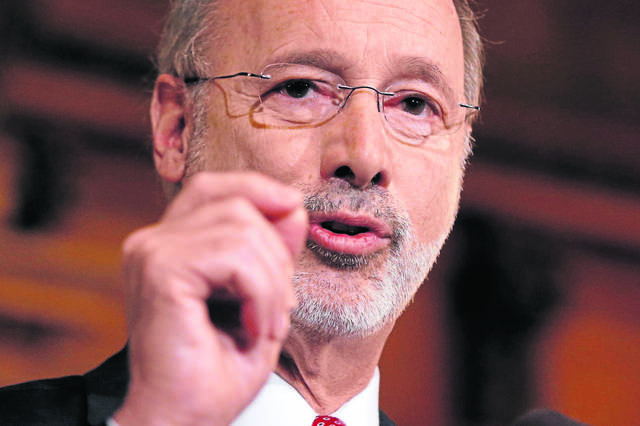https://triblive.com/local/regional/gov-wolf-argues-life-and-death-while-seeking-stay-in-covid-restrictions-ruling/
Gov. Wolf argues ‘life and death’ while seeking stay in pandemic restrictions ruling

Attorneys for Gov. Tom Wolf’s administration on Wednesday asked to stay the federal court decision from earlier this week in which a district judge ruled unconstitutional the state’s shutdown orders over the covid-19 pandemic.
Attorneys for the plaintiffs in the case said they will vigorously oppose any motion to stay — meaning, to suspend the ruling — and expect to file briefs on Thursday.
“It would be a terrible thing to stay an order that undoes things that are constitutionally infirm,” said attorney Thomas W. King III. He called it “reprehensible.”
In May, a group of seven businesses and their owners, as well as a congressman, three state representatives and Butler, Fayette, Greene and Washington counties, filed a complaint against the governor and state Health Secretary Rachel Levine. They argued that the closure of nonessential business, a stay-at-home order and an order to limit gathering sizes were unconstitutional.
U.S. District Court Judge William Stickman IV, in an opinion issued Monday, agreed. He found that the order that limits gathering sizes violates the First Amendment right to assembly; that the stay-at-home and business closure orders violate the due process clause of the 14th Amendment; and that the business closure order also violated the Equal Protection Clause.
In his 66-page opinion, Stickman, who was appointed to the bench last year, said the governor’s goals in taking action in the spring to slow the spread of the virus were laudable, but that they violated Pennsylvanians’ rights to individual liberty.
Gov. Wolf said that day he would appeal.
In the motion to stay Stickman’s ruling, the state attorney general’s office raised the specter of an increase in virus spread if the order restricting the size of public gatherings is lifted.
“This risk of harm to the public outweighs any harm to plaintiffs,” they wrote.
“Suddenly abandoning the current mitigation efforts will open the floodgates and allow the virus to freely spread throughout the commonwealth. And all of the progress Pennsylvania has made over the last six months will be for naught.”
The state’s attorneys in their filing wrote that staying the judgment will “allow a life-saving mitigation tool to remain in place and preserv[e] the lives of Pennsylvanians while the legal issues are addressed on appeal.
“Numerical limits serve to limit confusion, are easily understandable, and amendable to comparatively swift administration,” they wrote. “If all congregate limits are abandoned, the virus will be free to spread like wildfire throughout the commonwealth, resulting in an increased rate of infection and increased death. This harm cannot be undone.”
Further, they wrote, allowing large gatherings will increase the prevalence of “superspreader events,” leading to more deaths.
On Wednesday evening, King said the governor and his attorneys should be ashamed that they are trying to scare Pennsylvania’s residents again. Instead, he suggested that individual responsibility — wearing masks, washing hands and socially distancing is adequate.
A split in rulings noted
In their filings, the state’s attorneys addressed a split in courts within the Third Circuit, as well as the Pennsylvania Supreme Court, which have held that the orders were not unconstitutional.
“The split in authority created by the court’s opinion makes it difficult, if not impossible, for defendants to manage the pandemic effectively and has created confusion and uncertainty throughout Pennsylvania,” they wrote. “Any harm that a stay may cause plaintiffs is greatly outweighed by the public harm that will result if a stay is denied.”
The filing notes that Stickman did not consider either the manner in which the virus spreads or the rationale for adopting the congregate limits.
When ruling on a motion for a stay pending appeal, the court must consider whether the party will likely prevail on the merits of the appeal; whether they will suffer irreparable harm if the stay is denied; whether other parties will be substantially harmed and whether the public interest is served by granting the stay.
“Given the difficult legal questions, as reflected by a split in authority, and the extraordinary circumstances, including that there exists a public health crisis rendering this a matter of life or death, a stay is appropriate to preserve the status quo pending review by the Third Circuit,” attorneys for the state wrote.
Copyright ©2026— Trib Total Media, LLC (TribLIVE.com)
